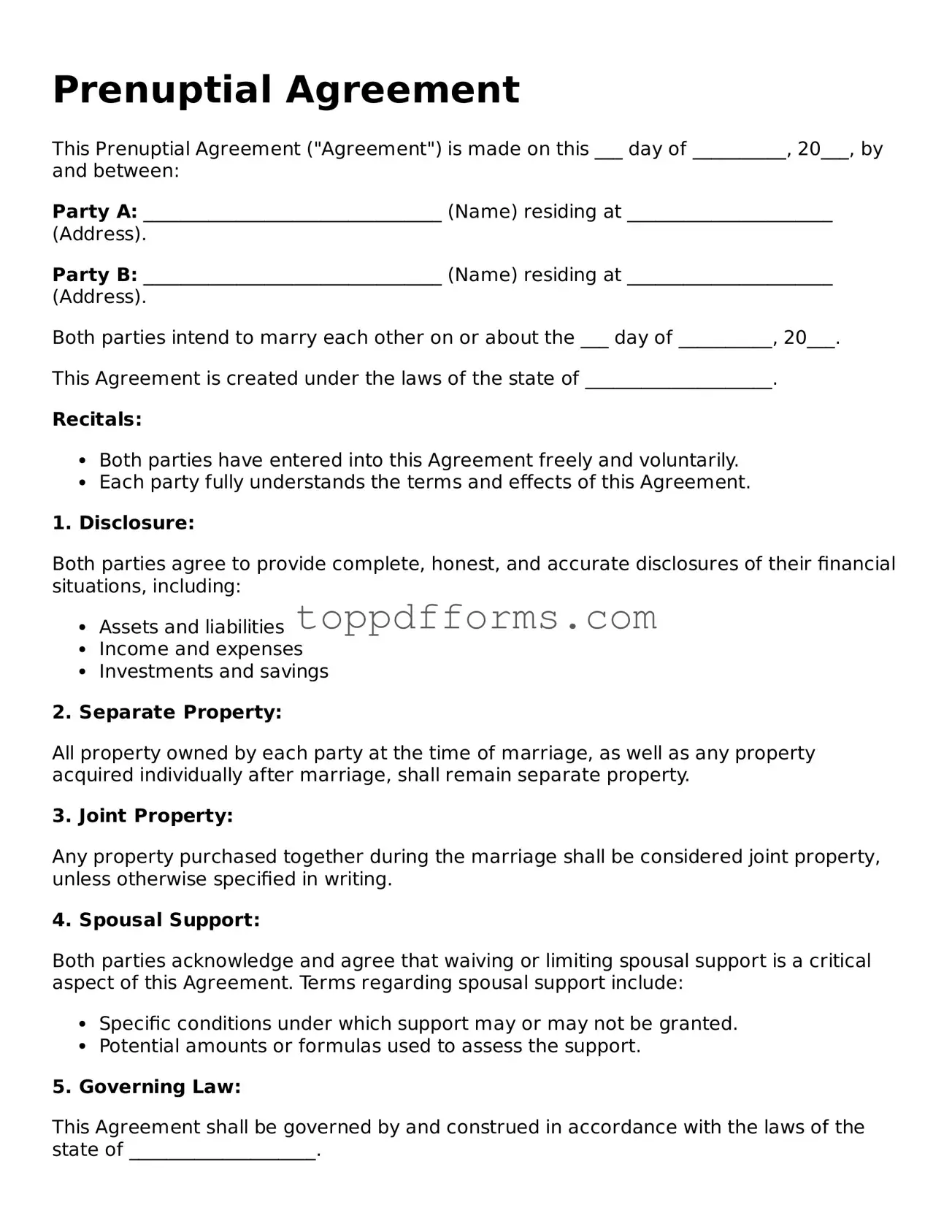Free Prenuptial Agreement Template
State-specific Guidelines for Prenuptial Agreement Documents
Things You Should Know About This Form
What is a prenuptial agreement?
A prenuptial agreement, often called a prenup, is a legal document created by two individuals before they marry. It outlines how assets and debts will be divided in the event of a divorce or separation. This agreement can also address other financial matters, such as spousal support. By establishing clear terms, a prenup can help protect both parties and minimize conflict should the marriage end.
Why should I consider a prenuptial agreement?
Many couples choose to create a prenuptial agreement to safeguard their individual assets and ensure financial clarity. If one partner has significant assets, a business, or children from a previous relationship, a prenup can provide peace of mind. It can also encourage open discussions about finances, which are essential for a healthy marriage. Ultimately, it allows both partners to make informed decisions about their financial future together.
What should be included in a prenuptial agreement?
A prenuptial agreement can cover a variety of topics. Common elements include the division of property, how debts will be handled, and provisions for spousal support. Couples may also choose to include details about how future income or assets will be treated. It's important to tailor the agreement to fit the unique circumstances of both individuals, ensuring that it reflects their wishes and needs.
Is a prenuptial agreement legally binding?
Yes, a properly executed prenuptial agreement can be legally binding. However, for it to hold up in court, certain criteria must be met. Both parties should enter into the agreement voluntarily, and it should be signed well in advance of the wedding. Full disclosure of assets and liabilities is also crucial. Additionally, having separate legal representation for each party can help ensure that the agreement is fair and enforceable.
Can a prenuptial agreement be modified or revoked?
Yes, a prenuptial agreement can be modified or revoked after it has been created. Both parties must agree to any changes, and it’s advisable to document these modifications in writing. If circumstances change significantly—such as the birth of a child or a substantial increase in income—couples may want to revisit their prenup to ensure it still meets their needs. Open communication is key to maintaining a fair agreement throughout the marriage.
PDF Overview
| Fact Name | Description |
|---|---|
| Definition | A prenuptial agreement is a legal document created by two individuals before they get married. It outlines the division of assets and financial responsibilities in the event of a divorce. |
| Governing Laws | Each state has its own laws governing prenuptial agreements. For example, in California, the Uniform Premarital Agreement Act applies, while in New York, the Domestic Relations Law governs these agreements. |
| Enforceability | For a prenuptial agreement to be enforceable, it must be in writing, signed by both parties, and made voluntarily without coercion. Full financial disclosure is also typically required. |
| Common Provisions | Common provisions in prenuptial agreements include asset division, debt responsibilities, and spousal support. Couples can customize these terms based on their unique situations. |
Common mistakes
When preparing a Prenuptial Agreement, many individuals overlook crucial details that can lead to complications down the line. One common mistake is failing to fully disclose assets and debts. Transparency is vital in a prenuptial agreement. If one partner hides significant financial information, it can lead to disputes and potential legal challenges later. Both parties should provide a complete picture of their financial situation to ensure fairness and clarity.
Another frequent error is not considering future changes. Many couples focus solely on their current financial status without thinking about how their circumstances might evolve. Life events, such as career changes, inheritance, or having children, can significantly impact financial situations. Including provisions that address these potential changes can help prevent misunderstandings in the future.
People also often rush through the process without seeking professional advice. A prenuptial agreement is a legal document, and its implications can be complex. Consulting with a lawyer who specializes in family law can provide valuable insights and help ensure that the agreement is enforceable. Without proper legal guidance, individuals may miss important legal requirements or make decisions that could negatively affect them later.
Lastly, many couples neglect to review and update their prenuptial agreements after significant life changes. It’s essential to revisit the agreement periodically, especially after events like marriage, the birth of children, or changes in financial status. Keeping the agreement current ensures that it reflects the couple's evolving relationship and financial landscape, helping to avoid future conflicts.
Common Documents
How Do You Get Pay Stubs If You Are Self Employed - Provides a snapshot of a contractor’s work and associated earnings within a specific timeframe.
Understanding the importance of having a legal framework in place for decision-making is essential, especially when it comes to health and finances. The Durable Power of Attorney form allows individuals in Michigan to appoint a trusted person to handle their affairs when they are unable to do so, ensuring that their wishes remain respected and followed. This proactive step can bring peace of mind, knowing that one's preferences will be honored even in challenging situations.
Job Application Spanish - Specify if you are looking for full-time or part-time work.
